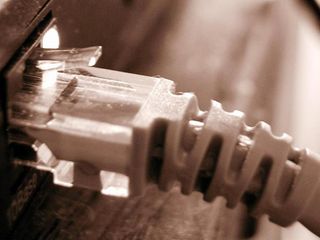Virgin Media: Broadband crunch point is coming
People's connection speed lagging behind their usage

Virgin Media believe that there is a crunch point coming for superfast broadband, where consumers will begin to notice that their internet connection is not supporting their digital life at home.
According to Virgin Media's executive director of broadband Jon James, the roll out of increasing numbers of 'up to 20Mbps' services by many companies is not seeing a significant rise in the average internet speeds to the home, and many people will be disappointed with the service they get.
James believes that the average of around 3.8Mbps to homes is now being pushed by people's use of streaming video over applications like the BBC iPlayer and other internet services.
Confusion among customers
"There is still confusion among confusion, enthusiastically supported by our competitors about what actual speeds people get," said James, in a briefing.
"I think there is a point coming, and I think it's starting to happen, where the average DSL speed of 3.8 or 3.9 Mbps that as you get into the world of people watching streaming video in real quality - whether that is HD or just SD but blown up onto a bigger screen - people are getting to the stage where, even on a very normal kind of usage, you seen contention…with real degradation of service."
James believes that what he calls a crunch point is quickly arriving, and that Virgin Media's cable network, rather than the DSL used by many of its competitors, is uniquely placed to give people speeds close to what is advertised.
Are you a pro? Subscribe to our newsletter
Sign up to the TechRadar Pro newsletter to get all the top news, opinion, features and guidance your business needs to succeed!
Crunch point coming
"There is a bit of a crunch point coming where people believe they have fast broadband but DSL speeds haven't moved on," added James.
"They will experience it explicitly – where it crashes – or more likely they will just be getting a video experience as bad as it was a year or two years ago.
"We think consumer awareness is beginning to grow rapidly, because we are genuinely seeing in our research a comfort with linking the broadband to the TV and a comfort with using video over PC.
"We're not suggesting it's completely mainstream or the number one question in sales but there has been a step change."
Responses
However, Michael Phillips of Broadbandchoices.co.uk believes that Virgin Media's competitors are not standing still
"There's no doubt that consumers are increasingly using bandwidth-hungry applications such as streaming TV but key to the user experience is how many computers are using to the same internet connection at the same time," Philips told TechRadar.
"In today's multi-PC/wireless hub homes this has a real drain on performance and products like Virgin Media's 50Mb broadband service are ideal for this.
"Virgin Media's cable network clearly has technical advantages in terms of absolute speed, but let's not forget that it only covers part of the country.
"The rest of us will be dependent of further strides in DSL technology such as ADSL2 and BT's Infinity product. And Virgin Media's competitors aren't standing still - BT is currently investing billions in its own fibre network.
"As providers offer ever-faster broadband packages, this will fuel ever-hungrier applications from content providers so it's a vicious circle. There will always be a demand for faster services."
Patrick Goss is the ex-Editor in Chief of TechRadar. Patrick was a passionate and experienced journalist, and he has been lucky enough to work on some of the finest online properties on the planet, building audiences everywhere and establishing himself at the forefront of digital content. After a long stint as the boss at TechRadar, Patrick has now moved on to a role with Apple, where he is the Managing Editor for the App Store in the UK.
Most Popular


